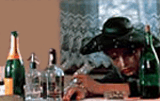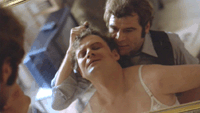The Anarchy of the Imagination is a compilation of interviews, essays, and notes by the talented, self-confident, and versatile provocateur filmmaker, Rainer Werner Fassbinder. Driven by an inexhaustible compulsion to entertain as well as provide social criticism, Fassbinder sought to elevate the role of contemporary German cinema. An avid cineaste, he developed his unorthodox approach […]
Tag: R.W. Fassbinder
Berlin Alexanderplatz, 1980
How does anyone begin to encapsulate the audacious, manic, insightful, resonant, humane, and allegorically loaded tone of the epic work – the quintessential “anarchy of the imagination” – that is Rainer Werner Fassbinder’s adaptation of Alfred Döblin’s nine book/thirteen chapter, Weimer Republic-era German Expressionist novel Berlin Alexanderplatz? Told from the perspective of an unemployed, hard-drinking, […]
The Third Generation, 1979
An early cursory comment that capitalists invented terrorism as a means of selling security (that, in turn, will safeguard their own survival) provides the trenchant context for Rainer Werner Fassbinder’s delirious and provocative satire, The Third Generation. Alluding to the emergence of a new generation of terrorists who, unlike their predecessors, lack a coherent agenda […]
The Marriage of Maria Braun, 1979
Maria Braun’s wedding day was anything but ordinary: a whirlwind two-week courtship, followed by a hurried marriage ceremony at the justice of the peace amid heavy Allied bombing during the final phase of World War II. Despite their union of “half a day and a whole night”, their marriage is not a transient consequence of […]
In a Year of 13 Moons, 1978
In a Year of 13 Moons opens to a curious image of an enigmatic figure – made exaggeratedly imposing by the isolated shot of the lumbering, awkward gait of ill-fitting industrial boots – unassuredly cruising a near empty tree-lined Frankfurt plaza at daybreak before catching the attention of a male prostitute who indiscreetly follows the […]
Mother Kusters Goes to Heaven, 1975
Mother Kusters Goes to Heaven opens to an portentous shot of a mechanized, tedious activity, as Emma Kusters (Brigitte Mira) and her son Ernst (Armin Meier) assemble small electrical appliances in silence at the kitchen table: snapping the mechanism to the case, tightening the sunken screws, packing the completed assemblies into a cardboard box. It […]





